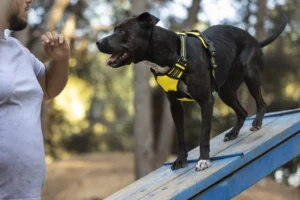How to Handle Dogs Barking: Causes, Solutions, and Tips
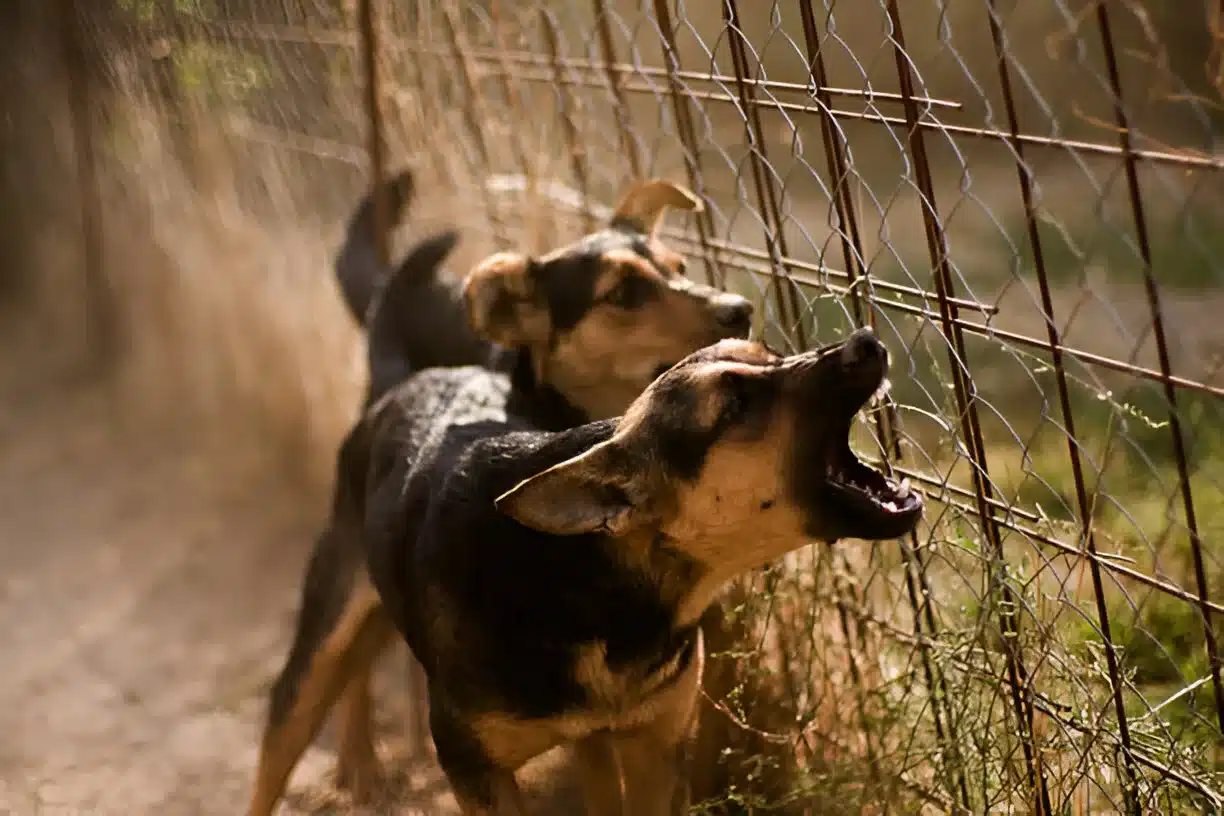
There are a lot of reasons why do dogs barking at people. Puppies can bark to welcome you or another animal, to play, or to protect themselves from frightful or intimidating intruders. Think of your puppy’s barking as a dog alarm.
For example, the arrival of a friend or stranger, a sudden sound, or an incredible sight, it acts as a warning about anything out of the ordinary, fascinating, or thrilling.
Instead of attempting to completely stop the pup from barking, determine the cause of his barking and teach him the distinction between problem and suitable barking.
In this guide, we will guide you on why do dogs bark at people. Stay tuned and read our post to the end.
Why Do Dogs bark?
Although there are numerous causes for dogs barking, territorial barking, excited barking, and lack of socialization are the three main causes of persistent dog barking. Dog training methods to specifically stop your dog from barking are informed by which of these causes your dog is exhibiting.
Below are the top reasons why do dogs barking at people.

1. Barking alarm:
Your dog will start barking in alarm if they hear an odd sound that attracts their attention.
2. Excitement
When they greet new people and other dogs, some puppies get excited. However, this is usually friendly, marked by a wagging tail and generally calm body language.
3. Take Note
Attempting to get your attention for playtime, food, treats, or just a little of your love are additional reasons why people bark.
4. Defending the Territory
Some puppies will bark to defend their territory when dogs and people from outside their rapid family intrude.
5. Fear of Separation
If your dog isn’t used to being alone when you leave the house, away from you, or out of sight, they may be barking because they have separation anxiety.
6. Boredom & Stress
Barking may increase if your puppy isn’t receiving enough mental and physical stimulation during the day.
Best Practices for Training
Given that dog barking is a natural tendency, it will take time to teach your dog to stop doing it, even with the best training methods.
Being patient with your dog and giving them positive reinforcement is crucial, as is consistent training.

1. The Silent Technique
After your dog begins to bark in front of a stranger, allow them to do so a few times. Say, “Quiet,” while holding their muzzle gently. Steer clear of yelling because it creates negative reinforcement. Remove your hands from the muzzle.
Reward them with a treat if they don’t talk. Repeat the procedure if they begin barking once more, rewarding them each time they stop.
Allow the command to fully sink in by gradually increasing the interval between treats. Try this method without holding your dog’s muzzle if doing so irritates them or makes them uncooperative.
Use your quiet command calmly instead, and then distract them with a treat or snack, such as a small piece of chicken, to take their mind off the stranger.
2. Actions to Prevent
It’s critical to implement preventative measures to keep your dog from interacting with strangers if you must leave them unattended, whether indoors or out.
Whether you typically keep your dog indoors or outdoors will determine how to stop them from barking when left alone. Make sure to keep the blinds and curtains closed when you leave your dog inside so they won’t notice any strangers.
For instance, a postal worker bringing a package or a person strolling by your yard on the street. A tall fence can help keep your dog from seeing past your yard if they prefer to be outside. The best fencing material for blocking visibility is opaque.
3. The Distraction Process
As easy as it may seem, one of the best ways to stop your pet from barking is to distract them. Shaking your car keys is a simple way to divert your canine. So, your dog’s attention is drawn to you by the jangling sound.
Once you’ve got their attention, tell them to “sit” and give them a treat if they comply. Hence consistent practice will teach your dog that good behavior is valuable and that barking at strangers will not result in a reward.
4. Diverting Public Focus
Refraining from allowing dogs who are too excited to bark continuously is crucial. You might attract a lot of people who want to interact with your dog if you are walking them.
Avoid rewarding your dog for barking for attention, even if the barking seems exciting and harmless. The best way to stop this is to turn around and walk away from the stranger calmly.
When they are noticed, any possibility of interaction is prevented. Also, you can reward your dog after they stop barking if you have treats on hand.
With practice, your dog will learn that barking makes it unattainable to speak with the person. Give your dog praise for their good behavior when they approach someone calmly.
Further, consult a dog trainer if your dog is still barking when you execute all of the strategies and still do not work.

5. Incentives for Successful Meetings
The best method for acclimating your dog to human socialization is exposure if their lack of socialization is causing them to struggle with dogs barking. You can use this practice to calm your puppy.
Ask everyone to be very affectionate and bring treats when you invite as many people as you can to your home at various times.
Gradually, your dog will learn that new people will show him love, affection, and treats in return.
As much as you can, take your dog for walks in a variety of locations to help him or her learn that strangers are not dangerous, even if they are in a strange place.
Dogs have remarkable memories, especially when it comes to recognizing people. When asked, “Do Dogs Remember People?” the answer is a resounding yes! They can remember familiar faces, scents, and even specific interactions with individuals for years. This ability to recall is why your dog may greet someone warmly, even if they haven’t seen them in a long time.
Positive experiences with people leave a lasting impression, helping your dog feel more comfortable and secure around strangers over time. By fostering consistent and friendly interactions, you can strengthen your dog’s trust in humans and enhance their social skills.
How to Lessen Excessive Barking
Given their intelligence, energy, and social nature, dogs require a lot of exercise, activities, and companionship in order to stay happy and healthy. Your dog may bark for longer periods of time if they are bored.
Moreover, there are plenty of reasons why do dogs bark at people. And why do dogs bark too much? So, you will need to reduce it by using these techniques.
To prevent boredom in your dog, make sure they have enough activities to do each day.
Create a wholesome routine – Your dogs barking may be an indication that they need attention, want to play, or want food. Ensure that your dog follows a daily schedule that includes mealtimes, playtime, and exercise at approximately the same time every day.
A solid routine can help your dog understand what will happen and when. By doing this, they might not bark for objects later.
According to research, 8 out of 10 dogs get stressed out when they are left alone, and they may bark to express this stress.
When your dog is by themselves, look for ways to help them feel more at ease and content, like leaving a special toy, hiring a dog-sitting service, or seeking professional assistance.
There are numerous reasons why dogs bark, so it’s important to identify the cause. Getting guidance from a specialist can help you identify the cause of the behavior and can also help you find the right resources.
How to Stop Your Dog from Barking Excessively
It’s crucial to ensure that your dog is trained to remain composed and self-assured from an early age, even in strange and unforeseen circumstances.
During their “socialization period,” which lasts from roughly 3 to 12 weeks of age, your puppy needs to be exposed to a variety of people, sounds, and situations in order for them to accept them as a natural and beneficial aspect of life.
This entails developing self-control when by yourself, acclimating to people entering and leaving the house, and accepting the postman knocking on the door.
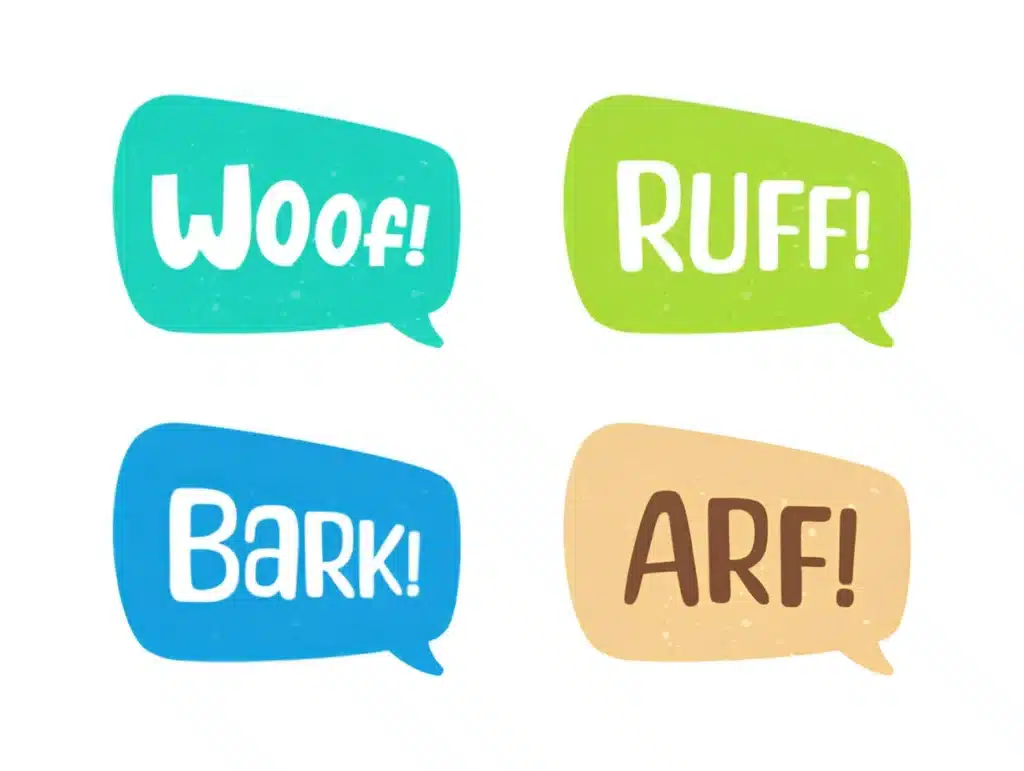
They will have the best chance of handling life’s challenges if they are exposed to it at a young age. It is vital to introduce new experiences gradually and under supervision.
Also, it’s critical that your dog doesn’t already have anxiety or fear in response to new experiences. The reason is that this could lead them to associate the new thing with these negative emotions.
Your puppy will have the ideal opportunity to learn these essential skills in the best Dog School classes, which offer professional guidance and hands-on instruction from knowledgeable coaches.
What Are The Most Barking Dog Breeds?
The size, appearance, and personalities of different dog breeds vary greatly. However, a common trait among many of them is their capacity for loudness.
While shrill yips and yelps are the hallmarks of some breeds, fearsome barks are the hallmarks of others. These six dog breeds are the loudest:
Golden Retrievers: One of the most well-liked dog breeds worldwide, golden retrievers are also renowned for their loud personalities.
The loudest bark in the world, measured at 112.5 decibels, is owned by a golden retriever named Charlie.
German Shepherds: Often used by law enforcement or the military, German shepherds are well-liked security dogs. Their booming, deep barks are well-known and can be intimidating.
High-pitched howls are characteristic of Siberian huskies, which they use to communicate with their packmates in the wild.
The deep, throaty barks of Rottweilers and Doberman Pinschers are well-known. Great guard dogs, Rottweilers, and Doberman pinschers frequently alert their owners to strangers.
Does a Dog’s Bark Mean Something?
Dogs use barking as a communication tool. It could be a call of distress, an invitation, a warning, or simply the dog’s happiness.
Your dog may bark repeatedly in a high-pitched voice if it is upset or afraid.
You can reduce your dog’s anxiety and make them feel more at ease if you can determine the cause of the bark.
Woof is the dog’s way of saying “hello.” Turn to face your dog and give them a friendly, energetic woof. The tone of your voice is crucial; a similar-sounding weuf means “Back off!”

How Can I Make Strangers Feel Welcome Around My Dog?
Socializing your dog from an early age is crucial for teaching them how to engage with strangers. Offering treats from a new or unfamiliar person is a smart way to accomplish this. By doing this, your dog will learn to associate positive experiences with new people.
Should my dog get a reprimand for barking at random people?
Barking can actually be made worse by yelling at your dog, reprimanding him, or even hitting him, according to the majority of dog experts. It will only make your dog more stressed if he is barking because he is afraid or anxious.
Attempt to desensitize your dog to the source of his barking and teach him some substitute behaviors, such as staying or sitting, in place of punishing him.
You shouldn’t be concerned because this is normal puppy behavior. Throughout her socialization phase, your puppy might bark at strangers, objects, and sounds.
Around 4 to 6 months of age, your puppy may begin to repeat this behavior. She will outgrow this stage if you continue to expose her to new people and situations in a constructive manner.
When Do Puppies Start Barking and How to Handle It?
Dogs begin to form bonds with the people around them around the age of 8 weeks, at which point they begin to bark. Oh, my goodness, puppies do go through a period of barking. So, the question is when do puppies start barking? The simpler answer is once they reach 2 months.
They might start barking at you at this point, saying, “Yip!” to begin their puppy barking phase. When puppies begin to bark, they are communicating with you vocally.
The puppy starts to form human bonds during that critical training period and learns what behaviors are acceptable and inappropriate around their human companions.
During this time, a puppy owner should begin teaching their pet manners and boundaries.

Tips for Handling your Dog Barking
Now you know when do puppies start barking, in this section, we aim to tell you how to handle your dog barking.
It may be irritating if your puppy barks excessively and loudly. Here are some suggestions to help lessen the barking of your puppy.
Our experts advise getting in touch with a respectable dog trainer or a veterinary behaviorist if you’re still having issues.
1. Lessen stress
Is your canine territorial or afraid of something? Removing these stressful objects from their line of sight is the best method to stop the barking.
To block out strange outdoor noises, try drawing the blinds, keeping them in a different room from the stressor, or turning on the TV or radio.
2. Maintain your dog’s calm and busyness
Before you leave for work, walk with your dog. Invest in puzzle toys to keep your dog’s mind active. Find a dog sitter or day care so your dog can meet new people.
If you want to calm your dog, try a pheromone diffuser. These factors can all help stop barking that is motivated by boredom or anxiety.
3. Experiment with training
The above methods aren’t working? You can try a variety of training techniques. For instance, leave your dog alone when they are barking and only give them treats when they stop.
Teach the word “quiet” or “hush.” Additionally, if you require additional assistance, you can hire a dog trainer.

When Do Dogs Start Barking?
The initial bark of your puppy will be very different from the adult’s bark. They will start to make little noises as early as 3 or 4 weeks of age. These tiny vocalizations will start to combine into a real bark at the age of 6 to 8 weeks, though it won’t be as intimidating as an adult’s
As part of their learning and development, puppies usually bark when interacting with their mother or playing with their littermates. Usually, a lot of dog owners ask a such question, when do puppies start barking? The short answer is when they reach 2 weeks.
A puppy may bark for a variety of reasons. Furthermore, it is not a given that puppies will bark at this age, even though some are capable of doing so. There’s usually nothing to worry about if your puppy is still a baby and not barking.
You might not hear your dog barking for months because this depends on a number of other factors, such as the breed and temperament of your dog.
The dogs that surround them teach pups as well. It might take longer for your puppy to bark if they are in your house alone and no other dogs are around.
Or they might start imitating them right away if you have a lot of barking dogs in the house. However, during the first few weeks of life, your puppy will typically be quiet.
The Value of Socialization
It’s important for your puppy to socialize and learn from other dogs, but they can also pick up bad habits. For instance, your puppy will probably follow suit if they are raised around dogs that bark for any reason.
Being around well-behaved and trained dogs is crucial for your dog’s socialization and training, as it will greatly aid your puppy’s behavior.
It’s crucial to stop bad habits before they become ingrained, so while barking should be observed, it shouldn’t be encouraged.
What Causes Puppies to Bark?
Why is my puppy barking at other dogs? is a question you may begin to ask. Or what’s causing my puppy to bark at me?

A puppy may bark at everything for a variety of reasons. There are numerous reasons why a puppy might bark at nothing or at the silhouettes of cats.
Your howling pups may be defending themselves from something or someone frightening, trying to attract your attention, bored, or simply greeting you with a bark. Moreover, if you need to know When do puppies start barking. The answer is when they reach 2 weeks old.
“The puppy barks when I leave the room,” many people inquire. Why? This puppy is barking and growling at me, but why?
Separation anxiety is also common in puppies. They are the puppy that barks when left alone because they haven’t learned how to handle being by themselves yet.
The good news is that if you convey this to your puppy, they will be able to trust you and learn through training that it’s acceptable to be by themselves occasionally.
Additionally, you can stop the puppy’s separation anxiety barking by giving them constructive activities to do while you are away.
What’s Causing My Dog to Bark?
Some of the causes of your dog’s excessive barking include the following:
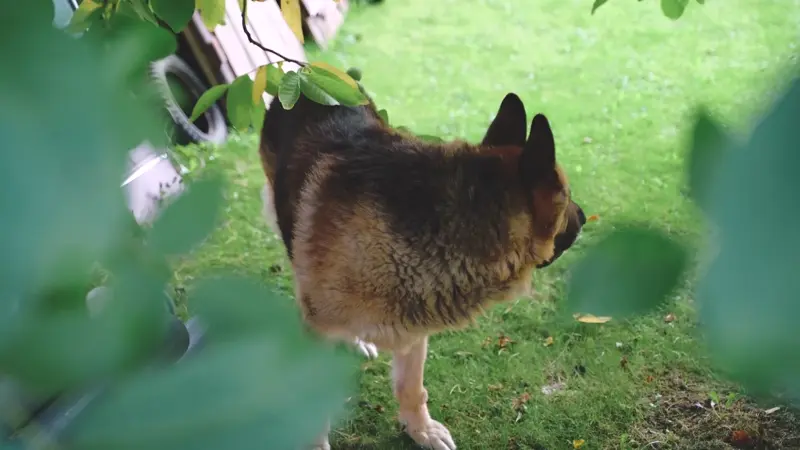
1. The boredom
The most frequent cause of barking is loneliness-induced boredom. Dogs frequently find ways to keep themselves entertained when they’re bored.
They might engage in undesirable behaviors like digging, chewing, or even acting aggressively. However, they can occasionally just bark to get your attention.
Your dog might begin barking to get your attention when you’re inside, for instance, if they are chained outside all day.
When the dog gets what they’re after, they will stop barking, which can be a temporary behavior.
2. Fear or Nervousness
Dogs may bark in response to frightening sounds or when they are experiencing anxiety related to something in their surroundings.
In certain situations, dogs may bark to interact with nearby dogs or people.
If so, the course of treatment might include giving your dog lots of mental and physical stimulation to keep them busy as well as making sure they feel safe and secure.
3. Anxiety about Separation
My dog barks all day long while I’m at work, and I’m not sure why. You may have asked yourself this question at some point, and you may have had no answers.
Due to separation anxiety, a dog that has been left alone may growl or even bark excessively.
Digging and chewing are two more destructive behaviors that are most likely to accompany this habit.
A dog trainer may need to provide behavioral correction therapy to dogs who are unable to remain alone, even for a brief period of time.
4. Health Issues
In order to rule out any underlying health issues, owners should consult their veterinarian if their dog barks excessively.
These medical issues are those that cause your dog pain and make them feel compelled to express it.

How to Stop Dogs from Barking Too Much
Most likely, you’ve been there before. You’re trying to unwind in your room, but your dog’s constant barking is disturbing you. Does that sound familiar?
We have some advice for you, though. Knowing why dogs bark in the first place is the first step. Fear, excitement, and boredom are a few typical explanations.
You may need to provide your dog with suitable toys, exercise, and/or a more stimulating and engaging environment if they are barking because they are bored or anxious.
They may simply need the right training and direction if they bark in an emergency or because they have to go outside.
1. Disregard the barking
Ignoring your dogs barking will be one of your first challenges. Start by ignoring the behavior until your dog stops talking. You are teaching your dog to bark when they need something nice if they do so in response to a treat and you give it to them.
Giving your dog what they want to reduce barking may be simpler, but it won’t work in the long run. They may begin barking excessively to get your attention as they gradually develop this behavior.
If your dog is barking out of fear, frustration, or apparent pain, don’t ignore them.
You should only ignore them when they are clearly not in danger and they are barking to get your attention.
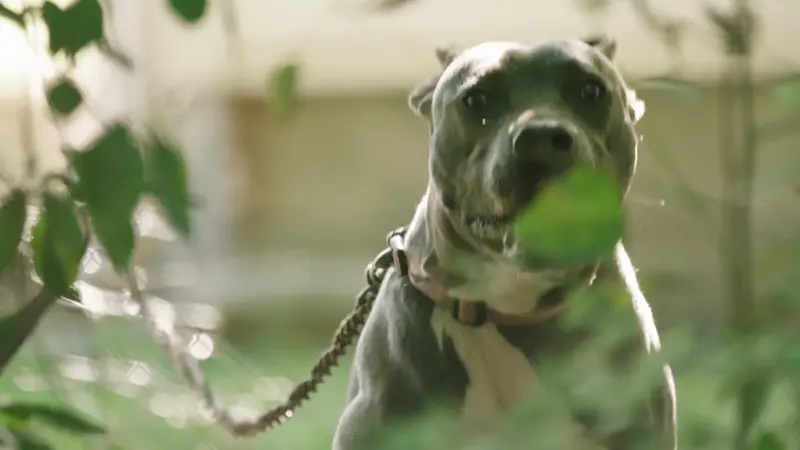
2. Introduce the barking stimulus to your dog
Your dog can become accustomed to the people, things, noises, and circumstances that cause them to bark. This will reassure your dog that they are safe around the stimulus, especially if they are feeling threatened.
Start by observing the main factors that cause your dog to bark. Anything you notice, no matter how insignificant it may seem, could be this.
Knowing what causes your dog to bark will help you determine when to begin training them to become accustomed to it. Further, if you want to know the exact answer When do puppies start barking? Consult with an expert dog trainer.
You can tell when a neighbor comes by your window every day and is ready to leave and get ready with your dog.
3. Issue a silent directive
To stop your dog from barking, try teaching him a “quiet” command. Dogs are good at following instructions. Your voice should be firm but relaxed when you say the word.
Yelling at your dog could frighten them and hinder their ability to learn. When your dog stops barking completely, give them praise and a treat.
They will eventually learn to associate the silent command with a delicious reward.
4. Teach your dog by using repetition and rewards.
Your dog might eventually become exhausted if they bark too much. You can now reassure them that they are not alone and that they can unwind by touching them and speaking in a soothing voice.
If your dog is barking because they need to go outside, you might want to wait for them to stop before doing anything.
You should ring the doorbell before letting your dog go outside. When they need to go outside, they will know what sound to look for thanks to this.
They can then be taught how to slowly ring the bell. Refrain from rewarding barking right away. When your dog wants something from you, this will cause them to bark every other time.
Give your dog a treat each time they wait at the door without barking.

5. Obtain expert assistance
Consider enrolling your dog in a training program if the aforementioned techniques don’t seem to be working and your dog is barking more and more. Because there are so many programs available, make sure to research them and choose the one that is most effective for your dog. You should enroll your dog in a training program that focuses on reducing barking.
Conclusion
Barking is an inherent part of being a dog; it’s their natural way of expressing emotions, needs, and responses to their environment. While excessive barking can be a nuisance, understanding its causes and managing it effectively fosters a harmonious relationship between you and your canine companion.
By identifying the underlying triggers of your dog’s barking – be it excitement, fear, territorial defense, or boredom – you can employ tailored strategies to address their behavior. Techniques like the “silent command,” positive reinforcement, and gradual desensitization are effective ways to teach your dog appropriate responses to stimuli. Preventative measures, such as creating a structured daily routine, providing sufficient physical and mental stimulation, and minimizing exposure to stressors, further help in reducing unwarranted barking.
Socialization also plays a pivotal role. Early exposure to various people, environments, and situations during your dog’s formative weeks builds confidence and reduces anxiety, making them less prone to bark in unfamiliar scenarios. For adult dogs with ingrained habits, consistent training, combined with patience and professional guidance if needed, can gradually lead to positive change.
It’s important to recognize that barking isn’t always problematic; it can serve as a valuable alert or an indicator of unmet needs. Observing your dog’s cues and understanding their unique temperament allows you to discern when barking is constructive and when intervention is needed.
Above all, cultivating a trusting bond with your dog is key. They look to you for guidance, reassurance, and love. Through compassionate training and consistent reinforcement, you can teach your dog to communicate in ways that are appropriate, ensuring they feel secure while maintaining a peaceful environment for everyone.
Remember, progress may take time, but with persistence, you’ll help your dog develop into a well-adjusted companion who thrives in their surroundings. Whether you’re addressing a puppy just learning to vocalize or an older dog with established habits, every step taken with care and understanding brings you closer to achieving a balanced and rewarding relationship. In embracing your dog’s natural instincts while guiding them with structure and love, you not only improve their behavior but also deepen the connection you share, creating a lifetime of joy, understanding, and mutual respect.



